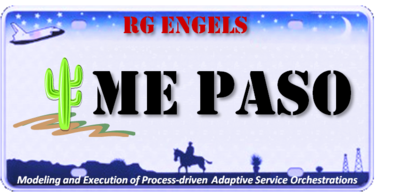Modeling and Execution of Process-driven Adaptive Service Orchestrations
Future software development will be different from how we build software today. Instead of coding software systems from scratch, future software will be a composition, integration, and orchestration of reusable software components, such as services or apps. The underlying key-driver is the need for fast reaction to changing customer requirements and increasing competitive markets. To address this new situation, highly flexible software systems are build that automatically adapt themselves to rapidly changing business environments.
The vision of highly flexible service compositions is already omnipresent in current trends such as service-oriented architectures (SOA), Cloud Computing, and Mash-ups in Web 2.0. In SOAs, IT processes orchestrate underlying services into service compositions that support business processes in enterprises. The used services are obtained from different sources including external services, which are provided by 3rd-party suppliers, e.g. through the cloud (Business-as-a-Service). Evidence for the success of business models that enable the reuse and composition of services in external applications and Mash-ups is shown by famous web applications such as Facebook or Twitter.
In the first project phase, the students will perform a business analysis on concrete case studies. This includes the identification and specification of flexibility and adaptivity in service orchestrations. In addition, existing Mash-up tools, such as Yahoo Pipes, Google Mapplets, and EyeOS are evaluated concerning their flexibility and their capability to deal with adaptivity. Next, the results and proceedings from the business analysis must be generalized in terms of a software specification methodology for process-driven adaptive service orchestrations. In the project's second phase, the students will implement a specification workbench including an execution and simulation engine for adaptive IT processes which orchestrate services. The project group's overall result will be a methodology and tool support for the design of highly flexible service compositions as needed by the industrial partners to compete in future markets.
During our work, we will closely cooperate with two industrial partners being Capgemini and syskoplan. Capgemini is a worldwide leading software development company located in Munich. The syskoplan group, headquartered in Gütersloh, is a leader in software integration focusing on innovative SAP solutions. Both companies provide case studies, realistic scenarios and data which are used in the project group. Further, employees of both companies will accompany and consult the student participants throughout the project and give talks on special related topics. The project group’s results will be presented to and – if applicable – applied by the companies. We take care of an appropriate and comfortable location :-)
The project group is held in English and the number of participants is limited.
Appointments
Seminar Phase (April 4th - May 31st, 2011)
| Date | Time | Room | Description |
|---|---|---|---|
| asap. | Make an appointment with your seminar topic supervisor | ||
| April 29th | 9 am - 11 am | “SAP NetWeaver” Presentation by syskoplan | |
| May 2th | 1 pm - 3 pm | "Presentation of scientific work" by Prof. Engels | |
| May 8th | 11:59 pm | Submit Peer Version 0.8 of your elaboration to your peer reviewers | |
| May 12th | 11:59 pm | Peer Review Deadline | |
| May 16th | 11:59 pm | Submit Version 0.9 to your supervisors | |
| May 19th | 11:59 pm | Reviews by your supervisors are send to you (or are discussed personally) | |
| May 22nd | 11:59 pm | Deadline Version 1.0 | |
| May 30th/31st | whole day | Seminar Presentations |
Project Phase (June 2011 - March 2012)
| Date | Time | Room | Description |
|---|---|---|---|
| June 10th | 10 am - 12 am | "Project Management" by Dr. Bäumker (syskoplan AG) | |
July 11th | 1 pm - 5 pm | 1st Review Meeting with industrial partners | |
| June 14/15th | Kick-Off Workshop |


